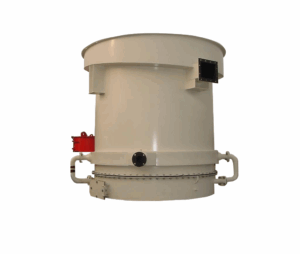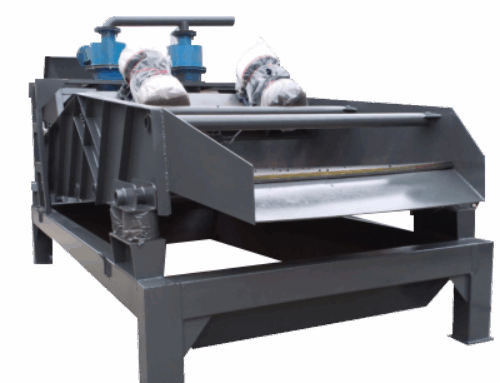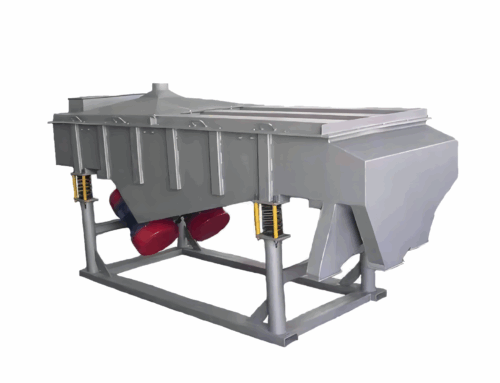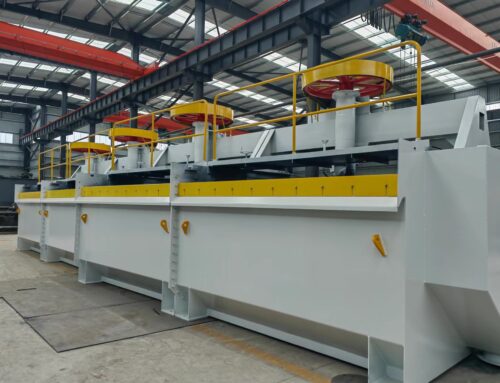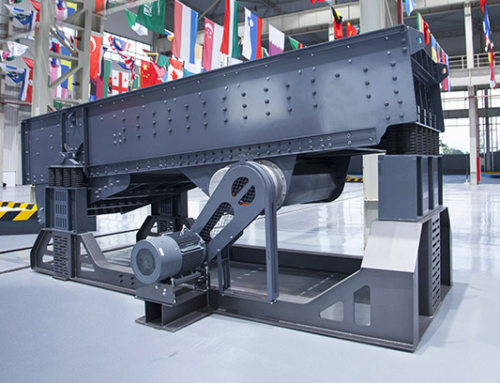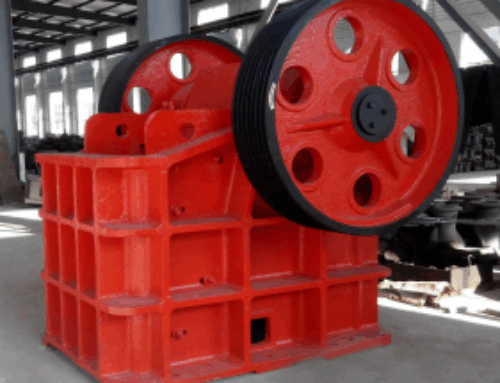In the process of coal washing and processing, how to effectively separate coarse coal slurry has been the focus of the industry. Coarse coal slurry usually refers to coal slurry particles with particle size between 0.15-3 mm, whose nature is different from both coarse coal particles and fine coal slurry, and it is more difficult to be sorted. Conventional coal sorting processes often face challenges of low sorting accuracy, complex equipment, and high operating costs when dealing with this material.Teetered bed separator provides an efficient, economical, and reliable solution for coarse coal slurry sorting and is widely used and recognised around the world. In this article, we will give you an in-depth understanding of the technical advantages of the teetered bed separator compared to other coarse coal sludge sorting equipment.
一.Technical Advantages of the TBS Interference Bed Sorter
1.Simple structure, easy maintenance
The overall structure of the teetered bed separator is relatively simple, mainly consisting of an inlet well, sorting drum, turbulent flow plate, density sensors, discharge valves and related piping components. Compared with some complex coarse coal slurry sorting equipment, it does not have too many moving parts and complex transmission devices. This makes the equipment in the operation process, the potential points of failure is greatly reduced. Routine maintenance mainly focuses on the cleaning of equipment surfaces, calibration of density sensors and checking of discharge valves, without the need for specialised and complex maintenance skills and a large amount of maintenance time.
2.High sorting accuracy
The teetered bed separator has excellent sorting accuracy, with an outstanding Ep value for possible deviations. Under ideal conditions, the Ep value of the TBS can be as low as 0.038, and is normally stable at around 0.08, with a guaranteed value of 0.12 being typical. This high accuracy enables the TBS to accurately separate impurities such as fine coal and gangue from the coarse coal slurry.
3.Large processing capacity
TBS interfering bed sorter has a strong sorting capacity per unit volume, usually, its sorting capacity per unit volume is about 3 times that of the traditional water classification equipment. Different models of TBS equipment processing capacity varies.
4.Sorting density can be controlled and adjusted
The TBS interfering bed sorter is equipped with an advanced density control system, which is capable of accurately regulating the sorting density. It has a wide range of effective sorting densities, which can be flexibly adjusted between 1.4-1.9g/cm³. In the actual production process, according to the change of coal quality and different requirements for product quality, the sorting density can be conveniently set and adjusted through the control system.
5.Low operating costs
On the one hand, the teetered bed separator does not require the addition of heavy media and chemicals during operation, and relies only on circulating water as the sorting medium. This greatly reduces the costs associated with media procurement, addition, recovery and media loss compared to equipment such as heavy-duty cyclones for coal slurry, which require the use of a large amount of micro-fine magnetite media.
二.Comparison between teetered bed separator and other coarse coal slurry sorting equipment
1.Comparison with coal slurry heavy-duty cyclone
Sorting accuracy: Coal slurry heavy-duty cyclone adopts small-diameter cyclone and sorts with higher feeding pressure and fine magnetite media. In the sorting process, the higher centrifugal coefficient makes the pulverised coal particles subjected to much larger force than that in the gravity field and the large-diameter heavy-duty cyclone, and the sorting accuracy is higher. However, TBS interfering bed sorter is not inferior in sorting accuracy, and its Ep value is similar or even lower than that of heavy media cyclone for coal slurry in some cases. For example, in some coal processing plants with very high requirements for coal quality, the teetered bed separator is able to achieve ash control of the coal product comparable to that of the slurry HRC, and in some cases, the Ep value of the teetered bed separator can be as low as 0.038, which is better than that of the common range of Ep values of the slurry HRC. Equipment Structure and Maintenance: The internal structure of the Coal Slurry Heavy Duty Cyclone is relatively complex and requires specialised media preparation, addition and recovery systems, as well as equipment to ensure the stability of the media suspension. This makes the maintenance of the equipment more difficult, requiring professional and technical personnel to operate and maintain, and maintenance costs are high. For example, coal slurry heavy media cyclone media recovery system, magnetite media purification, concentration and other links are prone to failure, once the failure occurs, the maintenance time is long and high cost. On the other hand, TBS interfering bed sorter has a simple structure, no complex media system, and the maintenance work mainly focuses on a few key components, so the maintenance difficulty and cost are significantly lower than that of the coal slurry heavy-medium cyclone. Running Costs: Due to the need to use a large number of fine magnetite media, the media procurement cost is high, and the media loss is large during the production process. At the same time, in order to ensure the recycling of the media and the sorting effect, the related equipment also has high energy consumption. In contrast, the TBS interfering bed sorter does not require heavy media, and only consumes a small amount of electricity to drive the rising water pump, so the operating cost is greatly reduced. According to statistics, the operating cost of the teetered bed separator is about 30%-40% lower than that of a heavy media cyclone for the same size of coarse coal slurry. Adaptability to changes in the feed material: The TBS is sensitive to changes in the nature of the feed material, such as particle size and density. When the coal slurry content, particle size composition or density distribution of the feed material changes, may lead to the stability of the media suspension is affected, which in turn affects the sorting effect, the need for frequent adjustment of equipment parameters. However, the teetered bed separator can adapt to changes in coal quality and maintain a relatively stable sorting effect by flexibly adjusting the speed and pressure of the rising water flow. For example, when the feed size range changes from 0.25-2mm to 0.15-3mm, the teetered bed separator only needs to adjust the upflow parameters appropriately to continue to ensure the quality and yield of the fine coal product, whereas the slurry heavy-duty cyclone may need to re-calibrate the entire media system.
2.Comparison with spiral sorter
Sorting precision: the sorting precision of spiral sorter is relatively low, its Ep value is generally around 0.2, which is significantly higher than that of TBS interference bed sorter. This makes it difficult for the spiral sorting machine to accurately separate the fine coal and gangue when separating the coarse coal slurry, resulting in the fine coal product may be mixed with more gangue and higher ash, which is unable to meet the market demand for fine coal with higher quality requirements. Sorting Density Control: The spiral sorter does not have a special density control system and cannot automatically control the sorting density accurately. Its sorting density range is relatively narrow, generally between 1.6-1.9g/cm³, which makes it incompetent in dealing with coal slurry that requires lower sorting density to obtain low-ash coal. The teetered bed separator is equipped with an advanced density control system, capable of accurately adjusting the sorting density within a wide range of 1.4-1.9g/cm³, to meet the sorting needs of different coal qualities and product quality requirements. Feeding requirements and product stability: the spiral sorter has high requirements for feeding, and needs a more uniform and stable feeding to ensure a better sorting effect. Once the feed fluctuations, product quality is easily affected, fluctuations. At the same time, the sorting tank of the spiral sorting machine is prone to wear and tear during long-term use, affecting the sorting performance and service life of the equipment. On the other hand, the teetered bed separator is more adaptable to the feed, does not need a complex feed distribution system, has a simple equipment structure, a low potential failure rate, and a relatively stable product quality. For example, during the production process of a coal preparation plant, when the feed fluctuates due to changes in raw coal mining conditions, the ash content and yield of the coal product of the spiral sorter will fluctuate greatly, while the teetered bed separator is able to maintain relatively stable sorting indexes.
With its unique working principle, the teetered bed separator demonstrates a number of significant advantages, such as simple structure, high sorting accuracy, large processing capacity, controllable and adjustable sorting density, and low operating costs. In comparison with coal slurry heavy media cyclone, spiral separator and other traditional coarse coal slurry sorting equipment, teetered bed separator excels in all key performance indexes, and can better adapt to the complex and changing needs of coarse coal slurry sorting. In terms of sorting performance, the teetered bed separator has a wider range of effective sorting density and higher sorting accuracy. Some traditional classification equipment, such as certain types of shaking table, although in a specific size and density range has a certain effect, but in the treatment of coarse coal slurry such as particle size and density distribution of more complex materials, the sorting effect is far less than the teetered bed separator, the TBS can be more accurately realised coarse coal slurry according to the density of the sorting, to improve the yield and quality of fine coal. With the coal industry’s continuous pursuit of efficient and clean coal sorting technology, the teetered bed separator is expected to play a more important role in the future of coarse coal slurry sorting, and become one of the key equipment for the optimisation and upgrading of coal sorting process.


